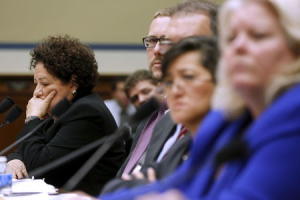
The conventional wisdom on Senator Bernie Sanders of Vermont is that he’s a charming if impractical dreamer, a pie-in-the-sky socialist who’s good at inspiring young people and aging hippies, but hopeless at the knife fighting that real-life politics requires.
Despite the inherent limitations of a self-described democratic socialist who eschews the norms of Beltway fundraising, the Democratic presidential candidate from Vermont has won legislative victory after victory on an issue that has been dear to him since his days as Burlington’s mayor.
That issue is the simultaneously benign and revolutionary expansion of federally qualified community health clinics.
Over the years, Sanders has tucked away funding for health centers in appropriation bills signed by George W. Bush, into Barack Obama’s stimulus program, and through the earmarking process. But his biggest achievement came in 2010 through the Affordable Care Act. In a series of high-stakes legislative maneuvers, Sanders struck a deal to include $11 billion for health clinics in the law.
The result has made an indelible mark on American health care, extending the number of people served by clinics from 18 million before the ACA to an expected 28 million next year.
As one would expect, the program was largely met with plaudits from patients and public health experts, but it has also won praise from even the biggest Obamacare critics on Capitol Hill. In letters I obtained through multiple record requests, dozens of Republican lawmakers, including members of the House and Senate leadership, have privately praised the ACA clinic funding, calling health centers a vital provider in both rural and urban communities.
To Sanders, the clinics have served as an alternative to his preferred single-payer system. Community health centers accept anyone regardless of health, insurance status or ability to pay. They are founded and managed by a board composed of patients and local residents, so each center is customized to fit the needs of a community. No two health centers are alike.
In rural North Carolina, ACA-backed health centers now provide dental and nutrition services, while in San Francisco, the clinics provide translation services and outreach for immigrant families. In other areas, they provide mental health counseling, low-cost prescription drugs, and serve as the primary care doctors for entire counties. They have also served as a platform for innovation, introducing electronic medical record systems and paving the way with new methods for tracking those most susceptible for heart disease and diabetes.
Author John Dittmer, in The Good Doctors, traces the history of the modern health center to the civil rights activists who ventured into the South during the early 1960s. The activists were seen as outside agitators, and local doctors refused to treat them. As a solution, volunteer bands of physicians were organized by a group called the Medical Committee for Human Rights.
Beyond treating the civil rights workers, the MCHR physicians were struck by the stark disparity in health services, encountering many African-Americans who had never seen a doctor before in their lives. The activist physicians returned to the South after the “Freedom Rides” to found a small clinic in Mound Bayou, Mississippi, in the heart of the Mississippi Delta, and by doing so, began a movement to launch health clinics across the country in underserved areas. Winning support from President Lyndon Johnson’s Office of Economic Opportunity, the clinics became part of Johnson’s “War on Poverty.”
Over the years, health centers have gained support on a bipartisan basis. Health centers secured critical funding from the efforts of the late Sen. Ted Kennedy, D-Mass., and both George W. Bush and John McCain campaigned on pledges to expand them.
Sanders’s place in health clinic history will be remembered for his forceful role in the winter of the health reform debate. In December 2009, tensions ran high as Congress inched closer to a final health reform deal. Sen. Harry Reid, D-Nev., tapped Sanders to help win support from liberals who thought the bill was too weak as well as from Democrats from rural states who were facing mounting pressure. More funding for community health centers, Sanders argued, was a win-win solution for both camps, since the program would ensure access to health care for even the most remote areas of the country while also helping those without insurance. Sen. Ben Nelson, D-Neb., among others, held out to the very last moment.
Two days before the Senate voted to break a Republican filibuster of the bill, Reid called on Sanders to make his case on the Senate floor. Sanders, in typical fashion, said the legislation was far from perfect, but thundered about the common-sense need for health centers, citing the acute demand for more primary care doctors, the cost-savings from patients who would otherwise use the emergency room for the common cold, the patient-centered model of clinics, and so on. Senate Democrats rallied and overcame the Republican filibuster.
Bernie Sanders on community health centers in the ACA from The Intercept on Vimeo.
Another turning point came several weeks later, when Massachusetts Republican Scott Brown won a special election in an upset victory, ending the Democrats’ filibuster-proof majority. Brown’s election brought Democrats close to despair, because lawmakers could only use a procedure called reconciliation to pass the law. Such a move would keep chances for passage alive while foreclosing any chance of enacting the much stronger legislation that originated in the House of Representatives through a conference committee. For progressives, it was a painful blow that not only sealed the defeat of the Public Option insurance program but also removed many robust provisions they had worked hard to include. Again called upon to work out a solution with House liberals, with whom Sanders enjoys a strong working relationship, the Vermont senator forged a deal to build support for the bill by focusing on health clinics.
Daniel Hawkins, vice president of the National Association of Community Health Centers, recalls that in the end Sanders was able to negotiate with Rep. Jim Clyburn, D-S.C., to increase health clinic funding through a special technical amendment that could modify the reconciliation Senate bill through a simple majority vote. The technical amendment passed, with $9.5 billion targeted for health center operations and $1.5 billion for construction and renovation projects. The House passed the final Senate bill, and President Obama signed the legislation with $11 billion in health clinic funding into law on March 23, 2010.
“There was no one who played a more important role than Senator Sanders,” Hawkins says, remembering Sanders’s constant lobbying of other lawmakers to support the funding.
Although the
health reform has transformed the funding of local health clinics, few
patients even realize that the changes have occurred as a result of the
law, because few aspects of the health reform are explicitly branded as
being part of the ACA.
That relative invisibility has shielded health clinic funding from the hyper-partisan attacks faced by other provisions of the law. But it has also allowed Republican opponents of Obamacare to play a two-faced game. Every single congressional Republican has voted to repeal the entire bill, health center funding included. But many have taken credit for popular local health clinic programs funded by the ACA, without disclosing the source of the funds. Others have written letters expressing their support for the money.
As I reported previously for The Nation, Rep. Paul Ryan, R-Wis., among other Republicans, authored letters to the Obama administration to recommend ACA funding for local health clinics. Now, a new batch of letters, obtained through a Freedom of Information Act request, shows other requests by GOP leaders.
Rep. Steve Scalise, R-La., the House Republican whip, for instance, signed onto a letter with other members of the Louisiana congressional delegation to ask the Obama administration for health center funding in New Orleans. The proposed clinic, the letter noted, would build a graduate medical training program, a proposal that “will attract not only more citizens back to our community but provide critical training opportunities for our region’s future healthcare workforce.”
Sen. John Cornyn, R-Texas, the number two leader in the Senate, wrote at least 17 letters to the administration asking for funding, in cities such as Lubbock and Houston, for a wide range of programs, including clinics devoted to low-income rural residents and Asian-Americans in Texas. Senators Mark Kirk, R-Ill., Kelly Ayotte, R-N.H., David Vitter, R-La., Rob Portman, R-Ohio, and Pat Toomey, R-Pa., made similar requests.
It’s no wonder that politicians from rural states such as Texas would seek community health centers to better serve their constituents. A recent report from the Texas A&M School of Public Health found that only 9 percent of physicians practice in rural areas. Many rural Texans live in areas that are more than 30 minutes from the nearest hospital, which dramatically raises mortality rates in cases of medical emergencies.
Still, press releases from GOP officials have lashed out at the Affordable Care Act’s health center funding as some sort of “slush fund.”
Regardless of the politics, the success of health centers has been particularly satisfying for Sanders, who can simply point to his own state as a reminder of its impact. One in four Vermonters are now served by more than 50 health centers throughout the state, according to the senator’s office. Just last month, a new federally qualified health clinic opened in Shoreham, Vermont, to provide dental care, physicals and medication for common diseases.
Though his own role in securing the funds for the ACA is barely mentioned on his Senate website, the image gallery is adorned with pictures of Sanders beaming a smile as he breaks ground and cuts ribbons for various health clinic openings in Vermont.
Photo: Bernie Sanders, during a news conference on June 25, 2015. (Bill Clark/CQ Roll Call/AP)







